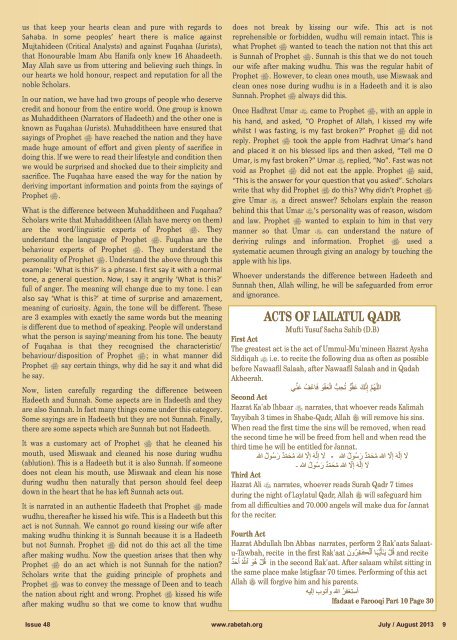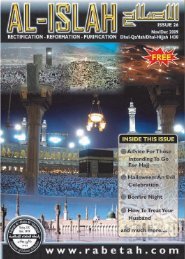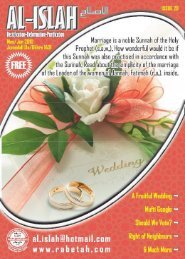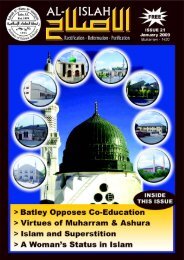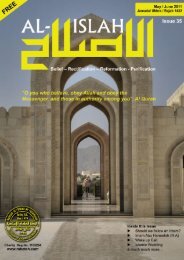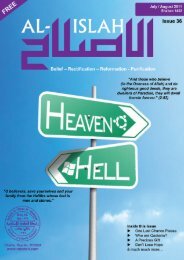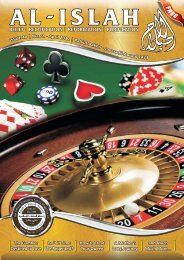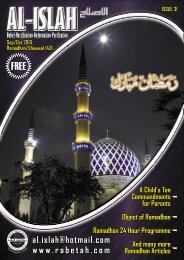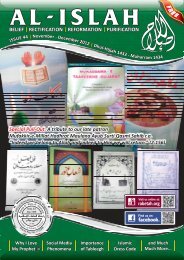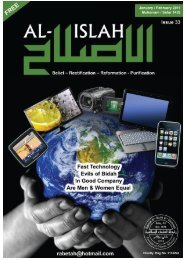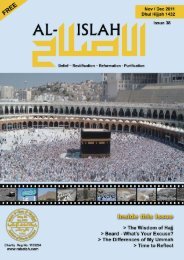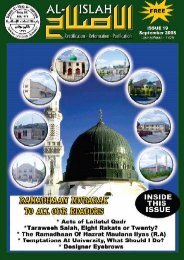Managment
Download (PDF, 4.8MB) - Rabetah
Download (PDF, 4.8MB) - Rabetah
- No tags were found...
Create successful ePaper yourself
Turn your PDF publications into a flip-book with our unique Google optimized e-Paper software.
us that keep your hearts clean and pure with regards to<br />
Sahaba. In some peoples’ heart there is malice against<br />
Mujtahideen (Critical Analysts) and against Fuqahaa (Jurists),<br />
that Honourable Imam Abu Hanifa only knew 16 Ahaadeeth.<br />
May Allah save us from uttering and believing such things. In<br />
our hearts we hold honour, respect and reputation for all the<br />
noble Scholars.<br />
In our nation, we have had two groups of people who deserve<br />
credit and honour from the entire world. One group is known<br />
as Muhadditheen (Narrators of Hadeeth) and the other one is<br />
known as Fuqahaa (Jurists). Muhadditheen have ensured that<br />
sayings of Prophet have reached the nation and they have<br />
made huge amount of effort and given plenty of sacrifice in<br />
doing this. If we were to read their lifestyle and condition then<br />
we would be surprised and shocked due to their simplicity and<br />
sacrifice. The Fuqahaa have eased the way for the nation by<br />
deriving important information and points from the sayings of<br />
Prophet .<br />
What is the difference between Muhadditheen and Fuqahaa?<br />
Scholars write that Muhadditheen (Allah have mercy on them)<br />
are the word/linguistic experts of Prophet . They<br />
understand the language of Prophet . Fuqahaa are the<br />
behaviour experts of Prophet . They understand the<br />
personality of Prophet . Understand the above through this<br />
example: ‘What is this?’ is a phrase. I first say it with a normal<br />
tone, a general question. Now, I say it angrily ‘What is this?’<br />
full of anger. The meaning will change due to my tone. I can<br />
also say ‘What is this?’ at time of surprise and amazement,<br />
meaning of curiosity. Again, the tone will be different. These<br />
are 3 examples with exactly the same words but the meaning<br />
is different due to method of speaking. People will understand<br />
what the person is saying/meaning from his tone. The beauty<br />
of Fuqahaa is that they recognised the characteristic/<br />
behaviour/disposition of Prophet ; in what manner did<br />
Prophet say certain things, why did he say it and what did<br />
he say.<br />
Now, listen carefully regarding the difference between<br />
Hadeeth and Sunnah. Some aspects are in Hadeeth and they<br />
are also Sunnah. In fact many things come under this category.<br />
Some sayings are in Hadeeth but they are not Sunnah. Finally,<br />
there are some aspects which are Sunnah but not Hadeeth.<br />
It was a customary act of Prophet that he cleaned his<br />
mouth, used Miswaak and cleaned his nose during wudhu<br />
(ablution). This is a Hadeeth but it is also Sunnah. If someone<br />
does not clean his mouth, use Miswaak and clean his nose<br />
during wudhu then naturally that person should feel deep<br />
down in the heart that he has left Sunnah acts out.<br />
It is narrated in an authentic Hadeeth that Prophet made<br />
wudhu, thereafter he kissed his wife. This is a Hadeeth but this<br />
act is not Sunnah. We cannot go round kissing our wife after<br />
making wudhu thinking it is Sunnah because it is a Hadeeth<br />
but not Sunnah. Prophet did not do this act all the time<br />
after making wudhu. Now the question arises that then why<br />
Prophet do an act which is not Sunnah for the nation?<br />
Scholars write that the guiding principle of prophets and<br />
Prophet was to convey the message of Deen and to teach<br />
the nation about right and wrong. Prophet kissed his wife<br />
after making wudhu so that we come to know that wudhu<br />
does not break by kissing our wife. This act is not<br />
reprehensible or forbidden, wudhu will remain intact. This is<br />
what Prophet wanted to teach the nation not that this act<br />
is Sunnah of Prophet . Sunnah is this that we do not touch<br />
our wife after making wudhu. This was the regular habit of<br />
Prophet . However, to clean ones mouth, use Miswaak and<br />
clean ones nose during wudhu is in a Hadeeth and it is also<br />
Sunnah. Prophet always did this.<br />
Once Hadhrat Umar came to Prophet , with an apple in<br />
his hand, and asked, “O Prophet of Allah, I kissed my wife<br />
whilst I was fasting, is my fast broken?” Prophet did not<br />
reply. Prophet took the apple from Hadhrat Umar’s hand<br />
and placed it on his blessed lips and then asked, “Tell me O<br />
Umar, is my fast broken?” Umar replied, “No”. Fast was not<br />
void as Prophet did not eat the apple. Prophet said,<br />
“This is the answer for your question that you asked”. Scholars<br />
write that why did Prophet do this? Why didn’t Prophet <br />
give Umar a direct answer? Scholars explain the reason<br />
behind this that Umar ’s personality was of reason, wisdom<br />
and law. Prophet wanted to explain to him in that very<br />
manner so that Umar can understand the nature of<br />
deriving rulings and information. Prophet used a<br />
systematic acumen through giving an analogy by touching the<br />
apple with his lips.<br />
Whoever understands the difference between Hadeeth and<br />
Sunnah then, Allah willing, he will be safeguarded from error<br />
and ignorance.<br />
ACTS OF LAILATUL QADR<br />
Mufti Yusuf Sacha Sahib (D.B)<br />
First Act<br />
The greatest act is the act of Ummul-Mu'mineen Hazrat Aysha<br />
Siddiqah i.e. to recite the following dua as often as possible<br />
before Nawaafil Salaah, after Nawaafil Salaah and in Qadah<br />
Akheerah.<br />
ت ِّإََّ َاْبَْفهاُهفَّعْ ااَُّّبِح ات إوهفإعه اكهنُإ<br />
َّ اُهْللا<br />
Second Act<br />
Hazrat Ka'ab Ihbaar narrates, that whoever reads Kalimah<br />
Tayyibah 3 times in Shabe-Qadr, Allah will remove his sins.<br />
When read the first time the sins will be removed, when read<br />
the second time he will be freed from hell and when read the<br />
third time he will be entitled for Jannat.<br />
َلَ إلههَ إَله هللا مُحَمهدٌ رَسُولُ هللا - َلَ إلههَ إَله هللا مُحَمهدٌ رَسُولُ هللا<br />
َلَ إلههَ إَله هللا مُحَمهدٌ رَسُولُ هللا<br />
-<br />
Third Act<br />
Hazrat Ali narrates, whoever reads Surah Qadr 7 times<br />
during the night of Laylatul Qadr, Allah will safeguard him<br />
from all difficulties and 70.000 angels will make dua for Jannat<br />
for the reciter.<br />
Fourth Act<br />
Hazrat Abdullah Ibn Abbas narrates, perform 2 Rak'aats Salaatu-Tawbah,<br />
recite in the first Rak'aat قَّلۡ ايهٰٰٓأ ه يحہهناٱ ۡ ڪهٰفبرَّعنها and recite<br />
in the second Rak'aat. After salaam whilst sitting in قَّلۡ اهَّعه اٱَّللَ َّاأهُّه د ا<br />
the same place make Istigfaar 70 times. Performing of this act<br />
Allah will forgive him and his parents.<br />
أستغفرُ هللا وأتوب إليه<br />
Ifadaat e Farooqi Part 10 Page 30<br />
Issue 48 www.rabetah.org July / August 2013 9


